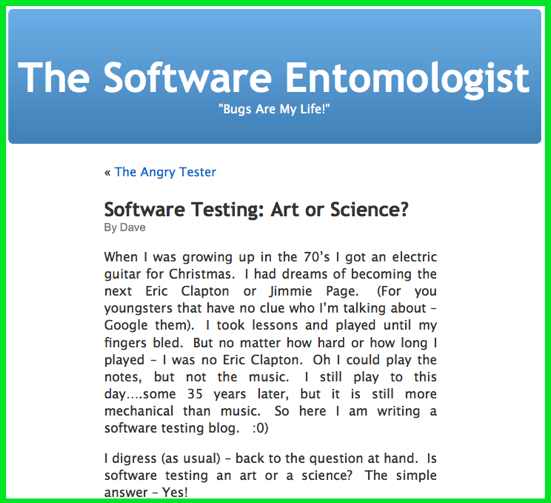What Software Testers Can Learn from the Game of 20 Questions

What Software Testers Can Learn from the Game of 20 Questions
Dave Whalen posted a good piece here asserting that software testing, done well, requires a blend of "Science" and "Art". I recommend it. (He also has a good post about testing databases here).

He includes the statement below which I agree with. If you are a software tester and any doubts about whether all of these methods work (pairwise software testing in particular), I would encourage you to conduct a pilot project on your own and measure the results achieved with and without the technique applied.
From the scientific side, testing can include a number of proven techniques such as equivalency class testing, boundary value analysis, pair-wise testing, etc. These techniques, if used properly, can reduce test times and focus on finding the bugs where they tend to hang out - much like a porch light on a summer night.
My response to Dave's post, included below, is not especially profound or even well-written, but, hey, I'm in a hurry in the pre-Thanksgiving rush and the topic hit close to home so I couldn't resist jotting a little something. Enjoy. Please let me know your thoughts / reactions if you have any.
Dave,
Very well said!
I wholeheartedly, enthusiastically agree with your premise. I also wish that more people saw things the same way.
My father co-wrote Statistics for Experimenters which describes the “art and science” within the Design of Experiments ("DoE") field of applied statistics. Well-run manufacturing companies use DoE techniques in their manufacturing processes. Many companies, such as Toyota see them as an absolutely fundamental part of their processes (yet unfortunately, software testers, who could use DoE techniques such as pairwise and other forms of combinatorial testing, are often ignorant about how to use them properly and the software testing industry as a whole dramatically under-utilizes such techniques…. but I digress).
I brought the book up because it opens up with a good example relevant to the points you made. To win at the game of 20 questions, it is useful to know “the science” of game theory and DoE; choose questions so that there is a 50/50 chance that the answer will be Yes. Someone who knows this technique, all else being equal, will be win more because of their “scientific” approach than someone who doesn’t know the technique. And yet… other stuff (whether the subject matter expertise in this example, or subject matter expertise and “artistic” Exploratory Testing in your example) is indispensable as well.
You can’t truly excel at either 20 Questions or software testing unless you have a good mix of “science” (governed by mathematical principles, proven methods of DoE, etc.) and and “art” (governed by experience, instincts, and subject matter expertise).


